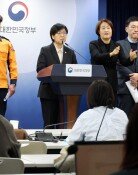Prosecutors should not speak but act
Prosecutors should not speak but act
Posted August. 28, 2000 21:30,
During the nationwide general meeting of the Public Prosecutor¡¯s Office directors convened on Monday at the conference room in the Supreme Public Prosecutor¡¯s Office, attended by 173 high ranking prosecutors, one of the matters intensively discussed was the strengthening of investigations into illegality and corruption, including irregularities committed by the leading class of society.
Public Prosecutor General Park Soon-Yong said that executing the law impartially following principles and the right path is the duty of the Public Prosecutor`s Office, and instructed the participants to secure law and order by strengthening special investigation activities into the breakdown of social order.
The meeting on this day was very similar to the hearing of the nationwide general meeting of the Public Prosecutor¡¯s Office directors held in January this year. At that time, too, Minister of Justice Kim Jung-Kil emphasized that if the law is strictly enforced in dealing with irregularities and illegalities of the powerful, public order can be fully established.
But if one looks in retrospect at the major cases that took place between these two nationwide general meeting of the Public Prosecutor¡¯s Office directors, it is obvious that there is a wide gap between the investigations and reality. Could it be described as saying and making the resolution that one should move straight ahead but walking like a crab?
The Public Prosecutor¡¯s Office has been procrastinating for over two months in the investigation of the case of political fund dissemination during the April 13 General Elections involving Dong-Ah Industrial, which emerged in the beginning of June. At that time, the Public Prosecutors Office stated that it would summon and investigate Dong-Ah Construction Chairman Koh Byung-Woo, who allegedly provided political funds worth around 1 billion won, and 3 others after the June 15 South-North Summit was concluded. However, prosecutors have yet to unveil the results of this probe.
Also, regarding Hanvit Bank`s illegal loan of a huge sum of money, although international attention is now focused on whether there was any external pressure during the lending process, the Public Prosecutor¡¯s Office appears hesitant to take action. The commonality between these two cases is that there are suspicions that politically related high-level figures are either directly or indirectly involved.
Prosecutors should not speak, instead. Even if prosecutors says that social order should be secured through strict investigations into the corruption of public figures and the upper class, but in actuality, it only reads faces of those who are strong. Wouldn`t this point become something that disturbs social order?







